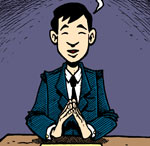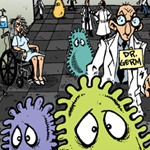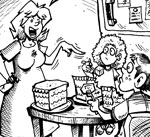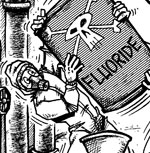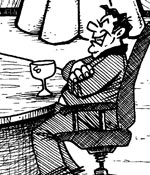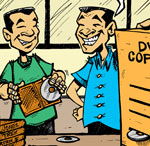Primary Insomnia - Life-Long Insomnia without an Identifiable Cause
| Share on Facebook | Share on Twitter | Share on Google+ |
Primary insomnia, which is also referred to as idiopathic insomnia, is defined in terms of what it is not. It is not a psychological disturbance. It is not caused by pain, noise, stress, or any physical illness. It begins in infancy and lasts throughout life, and most of the people who have it don't realize they have the condition. About 1 in 100 people has primary insomnia.
What Causes Primary Insomnia?
As is the case with almost any condition described as "primary," medical researchers don't really know what causes primary insomnia. Some neurologists believe that a lesion in the brain could explain the unusual sleep pattern, but MRI, CAT, and PET scans don't identify any such lesions in the brains of people who have primary insomnia and autopsy is not possible in living people.
Sometimes people who report the symptoms of primary insomnia (and the parents of the always-active children who have primary insomnia) are referred to sleep labs to rule out other, more easily treatable causes of sleep deprivation. It is very rare for someone has primary insomnia to have any other cause of insomnia except sleep apnea.
How is Primary Insomnia Treated?
Most people who have primary insomnia have had it all their lives and don't seek treatment. When sleep deprivation interferes with daytime activities such as driving, however, some ask their doctors for sleeping pills.
The most commonly prescribed medications for primary insomnia are the benzodiazepine tranquillizers. This class of medications includes dozens of drugs, most of which are too strong, potentially stopping breathing. A few benzodiazepine drugs such as brotizolam (Bondormin, Dormex, Lendorm, Lendormin, Noctilan, Sintonal), estazolam (Prosom), lormetazepam (Loramet, Pronoctan), quazepam (Doral), and triazolam (Halcion) are mild enough to be prescribed for sleep.
The problem with all of these medications is that they can cause the daytime drowsiness that sleep is intended to prevent. Most of them are habit-forming, with the result of rebound (worse) insomnia when the medication is stopped.
Commonsense Approaches to Primary Insomnia
Since medications don't work, people who want to minimize sleep loss caused by primary insomnia usually turn to practical remedies. A few that usually work include:
- Creating a bedtime routine, such as watching a few minutes of a late-night comedy program and always turning it off, turning down the lights an hour or so before bedtime, raising or lowering bedroom temperature, or taking a warm bath. The key to making a routine work is doing the same way every night, to establish cues for the brain to know it's time to sleep.
- Exercising in the afternoon, especially doing weight lifting. When you work out hard enough that muscles have to rebuild themselves, sleep comes more easily.
- Avoiding naps, especially in the late afternoon or evening.
- Minimizing use of alcohol (which interferes with sleep quality), caffeine, and nicotine, especially in the evening.
- Going to bed and waking up at the same time every day. If it's necessary to change bedtimes because changes in work or school schedules or travel, then it's best to alter bedtimes by 15 minutes every day until sleep time and waking activities on in sync, if possible.
You may also be interested in:
Mahowald, M.W. (March 2000). "What is causing excessive daytime sleepiness?: evaluation to distinguish sleep deprivation from sleep disorders" (Online, full text). Postgraduate Medicine 107 (3): 108-23.
-
Skin CareMen Skin Care
-
Free ResourcesFree eBooks
-
By creating an artificial environment, we're not stimulating our immune system enough. Germs are immune-stimulants. They challenge you to be prepared.Deepak Chopra
-
Featured Health Supplement
 If you find a product that is as effective as Total Balance, and is better value for money, let us know and we will give you a refund equivalent to your entire purchases of Total Balance…retrospective.
If you find a product that is as effective as Total Balance, and is better value for money, let us know and we will give you a refund equivalent to your entire purchases of Total Balance…retrospective.
-






